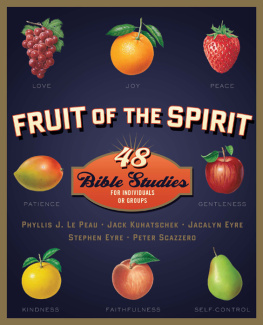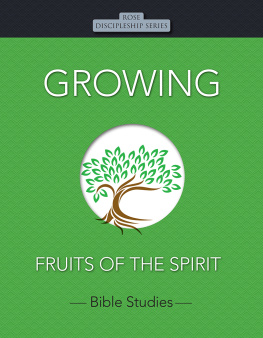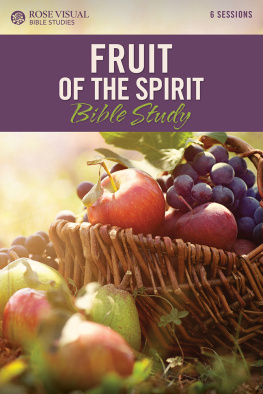
Other Studies in the Fruit of the Spirit Bible Study Series
Faithfulness: The Foundation of True Friendship
Gentleness: The Strength of Being Tender
Joy: How to Rejoice in Any Situation
Kindness: Reaching Out to Others
Love: Building Healthy Relationships
Peace: Overcoming Anxiety and Conflict
Self-Control: Mastering Our Passions

ZONDERVAN
Patience: The Benefits of Waiting
Copyright 1991, 2001 by Stephen Eyre
All rights reserved under International and Pan-American Copyright Conventions. By payment of the required fees, you have been granted the non-exclusive, non-transferable right to access and read the text of this e-book on-screen. No part of this text may be reproduced, transmitted, down-loaded, decompiled, reverse engineered, or stored in or introduced into any information storage and retrieval system, in any form or by any means, whether electronic or mechanical, now known or hereinafter invented, without the express written permission of Zondervan.
ePub Edition August 2009 ISBN: 978-0-310-86788-3
Requests for information should be addressed to:
Zondervan, Grand Rapids, Michigan 49530
ISBN: 978-0-310-55299-4
All Scripture quotations, unless otherwise indicated, are taken from the Holy Bible: New InternationalVersion. NIV. Copyright 1973, 1978, 1984 by International Bible Society. Used by permission of Zondervan. All rights reserved.
All rights reserved. The original purchaser of this product shall have the right to make one print-form copy hereof for such purchasers personal use.
Interior design by Melissa Elenbaas
CONTENTS
W elcome to Fruit of the Spirit Bible Studies. This series was written with one goal in mindto allow the Spirit of God to use the Word of God to produce his fruit in your life.
To get the most from this series you need to understand a few basic facts:
Fruit of the Spirit Bible Studies are designed to be flexible. You can use them in your quiet times or for group discussion. They are ideal for Sunday school classes, small groups, or neighborhood Bible studies.
The eight guides in this series can be used in any order that is best for you or your group.
Because each guide contains only six studies, you can easily explore more than one fruit of the Spirit. In a Sunday school class, any two guides can be combined for a quarter (twelve weeks), or the entire series can be covered in a year.
Each study deliberately focuses on only one or two passages. That allows you to see each passage in its context, avoiding the temptation of prooftexting and the frustration of Bible hopscotch (jumping from verse to verse). If you would like to look up additional passages, a Bible concordance will give the most help.
The questions help you discover what the Bible says rather than simply telling you what it says. They encourage you to think and to explore options rather than to merely fill in the blanks with one-word answers.
Leaders notes are provided in the back of the guide. They show how to lead a group discussion, provide additional information on questions, and suggest ways to deal with problems that may come up in the discussion. With such helps, someone with little or no experience can lead an effective study.
SUGGESTIONS FOR INDIVIDUAL STUDY
1. Begin each study with prayer. Ask God to help you understand the passage and to apply it to your life.
2. A good modern translation, such as the New International Version, the New American Standard Bible, or the Revised Standard Version, will give you the most help. However, the questions in this guide are based on the New International Version.
3. Read and reread the passage(s). You must know what the passage says before you can understand what it means and how it applies to you.
4. Write your answers in the space provided in the study guide. This will help you to clearly express your understanding of the passage.
5. Keep a Bible dictionary handy. Use it to look up any unfamiliar words, names, or places.
SUGGESTIONS FOR GROUP STUDY
1. Come to the study prepared. Careful preparation will greatly enrich your time in group discussion.
2. Be willing to join in the discussion. The leader of the group will not be lecturing but will encourage people to discuss what they have learned in the passage. Plan to share what God has taught you in your individual study.
3. Stick to the passage being studied. Base your answers on the verses being discussed rather than on outside authorities such as commentaries or your favorite author or speaker.
4. Try to be sensitive to the other members of the group. Listen attentively when they speak, and be affirming whenever you can. This will encourage more hesitant members of the group to participate.
5. Be careful not to dominate the discussion. By all means, participate! But allow others to have equal time.
6. If you are the discussion leader, you will find additional suggestions and helpful ideas in the leaders notes at the back of the guide.
L ord, I want patience, and I want it right now! It is easier to joke about patience than to become patient. You can tell that God is growing patience in you, not when you are patient, but when you run into frustrating experiences; when others fail to meet your expectations; when people you depend on let you down; when the things you depend on keep breaking. Most of all, you know you are learning patience when you call out to the Lord for help, and he seems to be on vacation.
I am not an expert on patience; it doesnt come naturally to me. I am constantly aware that there is more to do than there is time to do it. Frequently, there is a sense of urgency that pushes me from the inside.
There are lots of reasons for this inward push: my inward desire to feel important and productive, and the perceived expectations of family and friends to get things done. Even the commercials on television tell me to hurry if I am to take advantage of the best deal available today only.
God is not pleased with this sense of hurry. As a result, my life with him has included a lengthy term of schooling in a different way of living. When I say, Quick, God seems to say, Slow. When I say, Now, God seems to say, Later.
In puzzling through these frustrating interactions with God, I have come to see that waiting, and the patience it requires, occupies a central role in Scripture in shaping Gods people. God called Abraham and promised him a whole nation of children. Yet during his life Abraham had only one son, and he had to wait over twenty-five years for him to be born. Along the way, Abraham had some very wonderful and very painful times with God.
God called David to be the king of Israel. But before David ascended to the throne, he had to live as a fugitive in the desert for ten years while Saul chased him. Even a cursory look at the book of Psalms reveals that David did not enjoy those years. Yet God thought they were important for David and used them to shape Davids character.
Learning to wait patiently on God is worth it. The benefits include the ability to influence others in godliness, the certainty of Gods blessings, a deeper knowledge of Scripture, a growing patience and forgiveness of others, and a certain hope to sustain us even in the darkest times.












